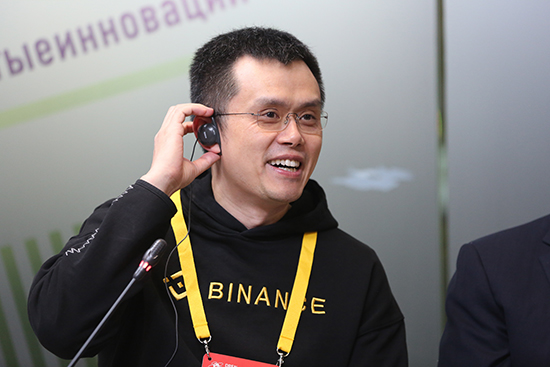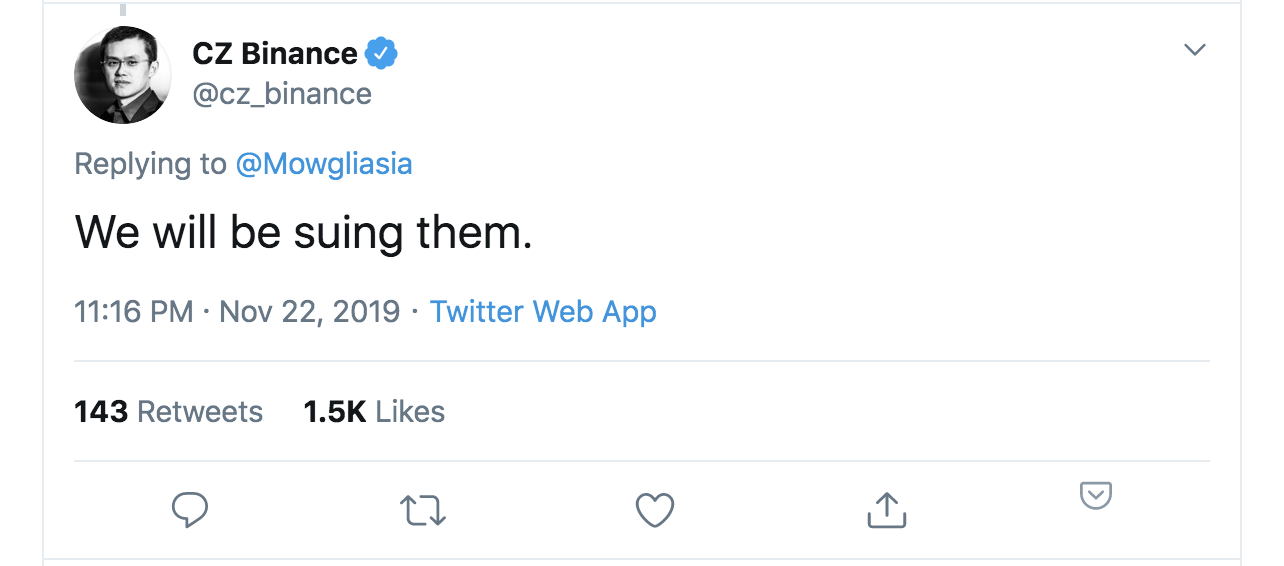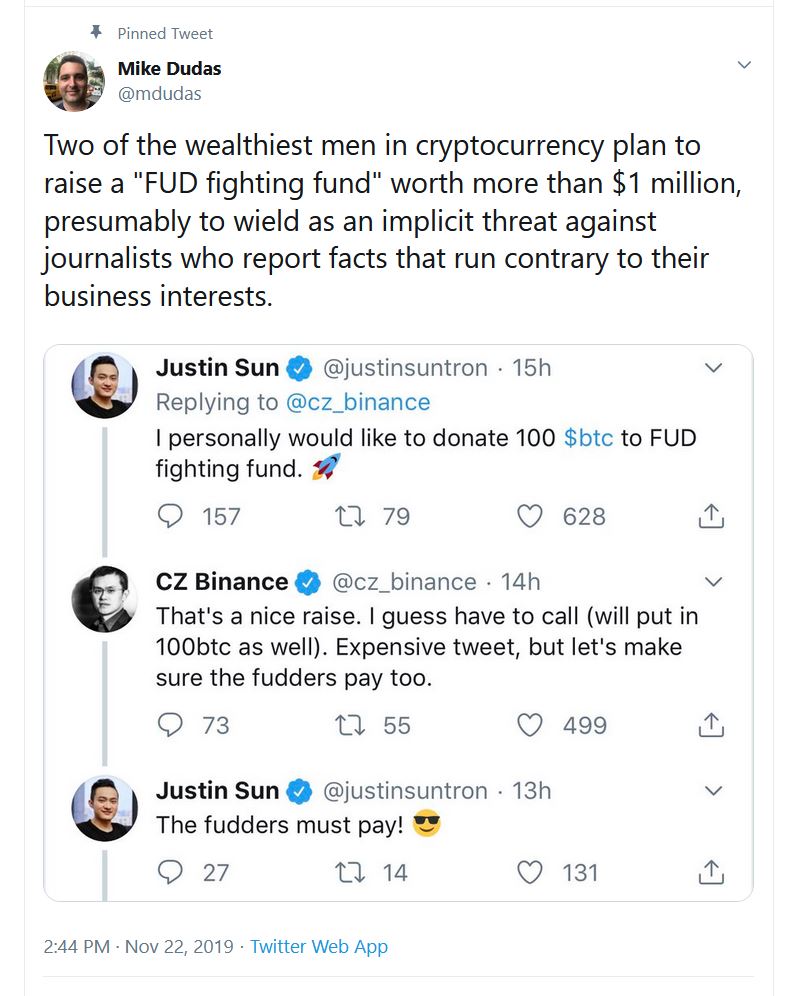币安事件的教训:想不变成骗子窝,加密货币行业需要加强监督

|
撰写区块链和加密货币报道至今已经有五年多时间,我发现该行业最顽固也是最不幸的一件事情是,它对记者有着无端的敌意。11月末,这一幕在一个奇怪的口水战中再次上演,故事涉及加密货币行业两家最为重要的公司:总部位于马耳他的加密货币交易所巨头币安,以及专注于加密货币交易的刊物《区块》。 故事是这样的,当《区块》报道,币安上海办事处遭到了当局的突击检查,随后关闭。币安不仅否认他们遭到了“突击检查”,同时还称自己在上海并没有办事处。币安的创始人及首席执行官赵长鹏(业界又将其称为“CZ”)甚至来了个特朗普式的发飙,声称《区块》是“假新闻”,并威胁要起诉该杂志。 |
I’ve been writing about blockchain and cryptocurrency for more than half a decade now, and one of the most consistent and unfortunate things about the community is its irrational hostility to journalists. That was on display yet again at the end of November in a bizarre spat between two of the most important companies in crypto: giant Malta-based crypto exchange Binance, and crypto-focused trade publication The Block. The saga began when The Block reported that a Binance office in Shanghai had been “raided” by Chinese authorities, then shut down. Binance not only denied that they had been “raided,” but said that they had no office in Shanghai. Binance founder and CEO Changpeng Zhao (best known as simply ‘CZ’) even went Full Trump, declaring The Block to be “fake news” and threatening to sue. |

|
作为回应,《区块》刊登了其所称的莫须有办公室的照片,而且还详细说明了他们在最初报道中所援引的信息来自于亲眼所见的证人,包括组建办事处的管理层。其中一个线人——一名供应商——甚至宣称赵长鹏曾经亲自到访过这个臆想的办事处。 事实最终证明,面对《区块》的报道,币安拿不出什么有力的反驳证据。不过,该杂志倒是更改了标题的措辞,将“突击检查”变成了如今的“到访”。但币安最终扔下了这么一个论断,尽管有这么一个地方存在,而且那里的人也是在为公司工作,但这并不意味着它就是公司的办事处。 好吧。 一位看似是币安写手的评论员则信口开河地说道,这个办公室并非是办事处,因为“币安可能在不少地方都有类似的存在,只是一个个据点罢了。它们采用的是一种中心辐射模式。” 当然,这一点也是几乎各类规模现代公司的真实写照。《财富》杂志在纽约、旧金山、伦敦设有办事处,也在北京设立了办事处,这一点我们承认。 这种顾左右而言他的措辞显得尤为空洞,因为据知情人士称,就在今年秋天,币安曾经就建立战略合作伙伴关系与《区块》进行过探讨。(币安并未回复《财富》杂志的置评请求。) 考虑到来自于政府的压力,币安对事实的荒唐歪曲听起来还略为合理些。币安的官方总部位于马耳他,但赵长鹏出生于中国,而且公司似乎正在努力拓展其在中国的版图。但由于中国缺乏明确的法规,因此此类业务扩张取决于政府的态度,而且突击/到访发生数天之前,中国人民银行下令打击加密货币诈骗和交易所。币安可能希望通过否认《区块》的报道,来博取政府的好感。 至于威胁要起诉,很有可能只是做做样子罢了。专注于加密货币行业的律师布雷斯顿·拜尼虽然自己也与《区块》有过节,但他也警告币安,诉讼会让公司付出很大的代价。“在美国打诽谤官司是一项难以完成的任务。很明显,币安有着大量的资源,完全可以在其他地方打这场官司,但我想质疑一下这种公开自身信息逻辑的合理性,也就是说,在取证过程中与一群按桶买墨水的人打交道。” 换句话说,这场官司会大大增加币安的曝光度,而且不仅仅限于法庭取证过程。Castle Island Ventures专注于加密货币的投资者尼克·卡特称:“真正的故事在于,这个昧着良心向散户兜售无价值代币的离岸交易所,认为自己可以通过上诉的威胁,逼迫一个自命不凡的媒体刊物三缄其口。在他们试图博取美国监管方的欢心之际,这种做法对于他们来说没有任何好处。” 不管有多少表演成分在里面,打官司这种威胁确实能够吸引社交媒体上加密货币粉丝的注意力。更有甚者,赵长鹏随后还称加密货币初创企业应该“分配一些资金用于抵御FUD(恐惧、不确定性和怀疑)”在加密货币界看来,FUD几乎等同于“虚假新闻”。或者,就像《区块》的首席执行官迈克·杜达斯说的那样:“它相当于与其商业兴趣相反的事实。” “FUD防范基金”这一理念迅速得到了孙宇晨这类人的附和,后者是智能合约平台波场的创始人。然而孙宇晨的支持便很能说明问题,因为有人不断地用确凿的证据指控孙宇晨开展各种形式的欺诈活动,包括波场白皮书和代码抄袭,这些事件最终都被记者和研究人员曝光。 尽管存在明显的公开证据,但孙宇晨一直在否认这些报道。然而希望澄清自己的赵长鹏对它的支持感到十分高兴。赵长鹏自己此前似乎曾经威胁过《区块》,同时也曾经表示,在谈到中国的加密货币行业时,“有些事情还是不说为妙。” |
The Block responded by publishing photos of the supposedly nonexistent office, and detailing that they had sourced information in the original report through firsthand witnesses, including building management. One source, a vendor, even claimed that CZ was personally present in the imaginary workspace. Ultimately Binance turned out to have little substantive objection to The Block’s reporting. The Block did rephrase its headline, which now describes a “visit” by authorities rather than a “raid.” But Binance was ultimately left arguing that just because it had a place where people worked for the company, that didn’t make it an “office.” Okay. One commentator, seeming to speak as a proxy for Binance, took a particularly wild swing, saying that the office wasn’t an office because “Binance may have this presence here and there as clusters. They’re in a hub-and-spoke model.” This, of course, describes nearly every modern company of any size. Fortune has offices in New York, San Francisco, London, and – yes, we admit it – Beijing. The evasions ring especially hollow because, according to sources familiar with the situation, Binance was in talks about a possible strategic partnership with 区块 as recently as this Fall. (Binance did not respond to Fortune’s request for comment.) The absurd contortions by Binance make just slightly more sense in light of pressures from government. Binance is officially based in Malta, but Zhao was born in China and the company appears to be working to expand the business there. But the lack of clear rule of law in China makes such expansion subject to the whims of government, and the raid/visit came just days after the People’s Bank of China ordered a crackdown on crypto scams and exchanges. By pushing back on The Block’s reporting, Binance may somehow be hoping to curry favor with government. As for Binance’s threat to sue, it seems likely to have been posturing. Preston Byrne, a crypto-focused lawyer who has had his own conflicts with The Block, nonetheless warned that Binance had a lot to lose in litigation. “Proving a defamation case in the United States is a tall order. Binance obviously has considerable resources to bring litigation anywhere and against anyone it wishes, but [I] would query the wisdom of opening the kimono, so to speak, in a discovery process with a group of folks who buy ink by the barrel.” In other words, a lawsuit would mean big exposure for Binance – and not just in court discovery. “The real story here is that an offshore exchange which made its name hawking worthless tokens to retail investors with no compunction felt that they could bully an upstart media publication into silence through the threats of lawsuits,” says Nic Carter, a crypto-focused investor at Castle Island Ventures. “This can’t possibly be doing them any favors as they try and ingratiate themselves to US regulators.” However performative, the threat of a lawsuit did play well among crypto stans on social media. Zhao even followed it up by arguing that crypto startups should “allocate some funds for fighting FUD”. “FUD” – for Fear, Uncertainty, and Doubt – has come in crypto circles to be roughly synonymous with “fake news.” Or, as 区块 CEO Mike Dudas put it, “facts that run contrary to their business interests.” The idea of a “FUD fighting fund” was quickly cosigned by none other than Justin Sun, founder of the smart-contract platform Tron. This is revealing because Sun has been repeatedly and credibly accused of various forms of deception, including plagiarizing Tron’s whitepaper and code, that were ultimately revealed by reporters and researchers. Sun continually denied those findings despite public, obvious evidence, but Zhao seemed happy to have his support in the quest for truth. And Zhao himself has previously appeared to threaten The Block while arguing that when it comes to crypto in China, “some things are better left unsaid.” |

|
加密货币领域对媒体的不信任有很多原因。确实,一些主流金融和商业新闻源未认真对待过加密货币背后的理念。很多传说中的加密货币新闻网站实际上本身就是个骗子,只要给钱就报道。加密货币容易投资的事实意味着批判性的报道可能会引发众多线上投资人的反感。事实上,似乎很多人都认为,比特币价格下跌的罪魁祸首是《区块》的报道。 但人们在这场纷争中忽视了一点,记者并非只是那种对一切事物持批判态度的人士。他们是所有行业的免疫系统,会对任何功能障碍和即将来临的危险状况发出警告,从而希望在这些危险事物造成巨大伤害之前让公司和投资者做好应对的准备。2017/2018年的加密货币泡沫便缺乏可信任的严肃报道,这一现象或许让加密货币市场因为诈骗和歪点子而蒙受了数十亿美元的损失。 以当前的这个例子为例:就算《区块》不存在,没有去报道中国的监管环境,但攻击其报道的加密货币投资者将依然不得不面对未报道事实所带来的后果。政府依然有能力在任何时候取缔加密货币交易,只不过投资者无法获得有关这一事实的深刻洞见。 卡特说:“如果这个行业抛弃了对事实真相的关注,那么它将陷入一片混乱。任何对不当行为的报道对于该行业来说都是纯粹的利好消息,而且叫喊着‘FUD’的愤怒人群在意识到这一点后就不会那么惊慌失措。”(财富中文网) 译者:冯丰 审校:夏林 |
There are a lot of factors to the cryptosphere’s distrust of the media. It’s true that some mainstream financial and business news sources have never taken the ideas behind crypto seriously. Many purported crypto-news websites are effectively scams themselves, taking payment for coverage. And the ease of investing in cryptocurrency means critical reporting is likely to generate backlash from a lot of people with money on the line – in fact, many seemed to blame a subsequent drop in bitcoin’s price on The Block’s reporting. But what gets lost in that mess is that journalists aren’t just naysayers and scolds. They’re the immune system of any industry, warning of dysfunction and gathering storms, and hopefully giving companies and investors the ability to react before they become catastrophic. The lack of trusted, serious reporting during the 2017/2018 bubble arguably left the crypto market uniquely vulnerable to billions of dollars in scams and bad ideas. To spell this out in the current case: if The Block didn’t exist to report on the regulatory environment in China, the crypto investors who attacked its reporting would still have faced consequences from the unreported facts. The government would still have the ability to clamp down on crypto trading at any time – investors just wouldn’t have any insight into that fact. “If this industry abandons the pursuit of truth, it will degenerate into chaos,” says Carter. “Anything that sheds light on malfeasance is a net good for the industry, and the baying crowds yelling ‘FUD’ would do well to recognize that.” |













